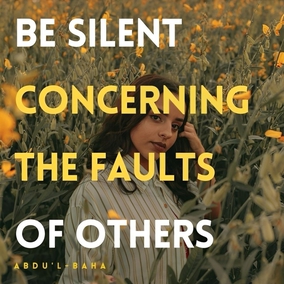The views expressed in our content reflect individual perspectives and do not represent the authoritative views of the Baha'i Faith.
Many of us feel deeply passionate about religion and spirituality–but our world, with its orientation around material things, can make it difficult to see how the life of the soul can fit into that framework.
With that problem in mind, let’s explore some ideas about the relationship between material life and spiritual development, and how these two things may not inherently oppose each other.
 The everyday activities we undertake to meet our needs for food, shelter, energy and other necessities of life have a disproportionately large influence on the shape of our lives. Like a star or planet with a massive gravitational pull, material life draws all smaller things into its orbit. For example, schools mostly teach us how to be good workers. Leisure, we’re trained, is a way to recuperate from the work-week. Professional artists produce work that enables them to make a living. We learn, because of this materialistic focus, not to do things for its own sake. Instead, most people, most of the time, put their energy into pursuits that secure the material livelihood of themselves and others.
The everyday activities we undertake to meet our needs for food, shelter, energy and other necessities of life have a disproportionately large influence on the shape of our lives. Like a star or planet with a massive gravitational pull, material life draws all smaller things into its orbit. For example, schools mostly teach us how to be good workers. Leisure, we’re trained, is a way to recuperate from the work-week. Professional artists produce work that enables them to make a living. We learn, because of this materialistic focus, not to do things for its own sake. Instead, most people, most of the time, put their energy into pursuits that secure the material livelihood of themselves and others.
Take a look at your calendar, and you’ll notice that your weekly schedule probably confirms this fact. We may derive the most all-around satisfaction from enjoyments like art, civic engagement, athletics, uplifting conversation, or acts of prayer and meditation. But the time we can allot to them is comparatively short. Very few people spend 40 hours a week in such activities. On the contrary, most adults in the world expend at least that much time earning the money they need to feed themselves and their families and keep a roof over their heads. So, even if our minds are attuned to the life of the spirit, we’re probably still utilizing the majority of our time in activities with primarily material purposes. That’s just reality, and life, and survival.
For material concerns to have such a powerful influence on the distribution of our time and energy might sound like a problem to those of us who see the life of the soul as the point and the pinnacle of human existence. Most of us would like to believe that high ideals drive our motivation in this life: freedom, love, equality, beauty, etc.—not only the need to make money.
Perhaps, though, nothing about this concept should strike us as spiritually unwholesome. Just because society revolves around economic needs doesn’t mean that spirituality is false or irrelevant. The massive gravity of economic life might just imply that our everyday efforts to secure a material livelihood provide the typical context for the soul’s development. It might mean that our spiritual path on this earth traverses a variety of practical dilemmas and worldly puzzles. If you look at the material world as a spiritual training ground, a matrix for the development of the soul, the material and the spiritual can complement each other.
A big difference exists between what my Christian friends call being “in” the world and being “of” the world. Just because we need to eat three times a day, doesn’t mean that food has to become our core aspiration in life. Our bodies may depend on our homes for protection from the elements. But real estate need not cage our minds and souls. The Baha’i teachings have this to say on the topic:
Life is a load which must be carried on while we are on earth, but the cares of the lower things of life should not be allowed to monopolize all the thoughts and aspirations of a human being. The heart’s ambitions should ascend to a more glorious goal, mental activity should rise to higher levels! Men should hold in their souls the vision of celestial perfection, and there prepare a dwelling-place for the inexhaustible bounty of the Divine Spirit.
Let your ambition be the achievement on earth of a Heavenly civilization! I ask for you the supreme blessing, that you may be so filled with the vitality of the Heavenly Spirit that you may be the cause of life to the world. – Abdu’l-Baha, Paris Talks, p. 99.
When Abdu’l-Baha calls on everyone to “hold in their souls the vision of celestial perfection” he doesn’t say we should forget about this world. Instead he says we should aim for “the achievement on earth of a Heavenly civilization.” That’s an inspiring goal to keep in mind as we strive for the elevation of our souls.
The spiritual qualities we want to develop in ourselves all have a role to play in the improvement of society. That’s because the expression of these virtues usually relates to some definite material condition. For example, Most of the time, when we say someone is trustworthy it is in relation to some valuable resource that they could steal or take advantage of but chose not to. When we forgive others, it is often for wrongs they have committed pursuing their own self-interest. When we practice self-sacrifice, we depart from our ordinary concern with comfort and security for the sake of something more important. It is of course possible to be generous with spiritual things. But most of the time when we talk about generosity it is with regard to things with some practical use.
In short, material dilemmas give the soul something tangible to latch onto as it climbs upwards to higher levels of spiritual development. Earthly existence doesn’t have to create obstacles for the expression of heavenly qualities. On the contrary, this material life can help us make our spirituality into something real and concrete.
















Comments
Sign in or create an account
Continue with Googleor